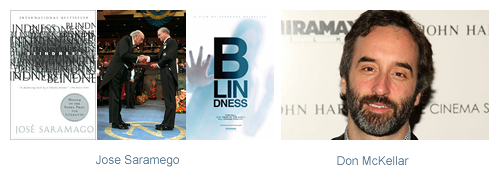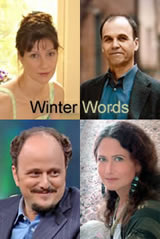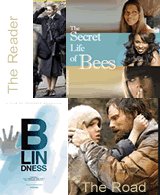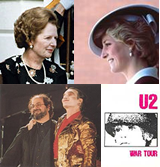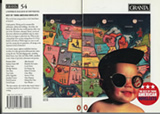The Secret Life of Bees (Film October 2008)
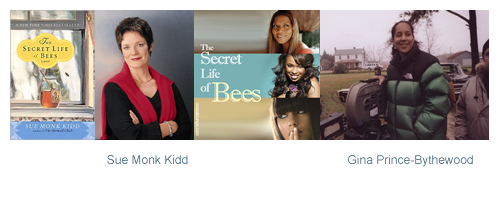
Set in South Carolina in 1964, The Secret Life of Bees tells the story of Lily Owens, whose life is shaped by her blurred memory of the afternoon of her mother's accidental death. When Lily's black "stand-in mother," Rosaleen, insults three racists in town, they escape to a town that holds the secret to Lily's mother's past. It won the Orange Prize and has been adapted into a film by Gina Prince-Bythewood that stars Shondrella Avery, Dakota Fanning, Hilarie Burton, Alicia Keys, and Queen Latifah.
"I’m ushered to a chair that has Sue Monk Kidd printed on it. Before I can play this up for the sake of the “entourage,” a young woman in a green North Face jacket comes over briefly to say hello. She’s the director, Gina Prince-Bythewood, and also the one who took my 301 page book and turned it into 106 pages of dialogue. When the script first arrived, I found I could not immediately read it. I hadn’t expected to be so nervous. I finally picked it up one night as I went to bed, thinking I would only read the opening scene. At 2:00 AM, I had finished the whole thing. I was bowled over by how good it was. Since then, I’ve had many conversations with Gina by phone and email, conferring, brainstorming, and in some cases, debating." Sue Monk Kidd
Reviews ׀ Interview
![]()
Blindness (Film October 2008)
Blindness is a dramatic film that is an adaptation of the 1995 novel of the same name by Nobel Laureate, José Saramago about a society suffering an epidemic of blindness. The film is written by Don McKellar and directed by Fernando Meirelles with Julianne Moore and Mark Ruffalo as the stars.
Don McKellar said about adapting the story, "None of the characters even have names or a history, which is very untraditional for a Hollywood story. The film, like the novel, directly addresses sight and point of view and asks you to see things from a different perspective." McKellar wrote the script so audiences would see the world through the eyes of the protagonist, the Doctor's Wife. He sought to have them question the humanity of how she observes but does not act in various situations, including a rape scene.
NY Times Review ׀ NPR Interview
![]()
The Road (Film November 2008)

The Road, by Cormac McCarthy is the story of a father and son navigating their way through a desolate, post-apocalyptic landscape caused by an unknown disaster. It won the Pulitzer Prize for Fiction.
"You need to know how the novel works," says Joe Penhall (the screenwriter,) "really study its entrails, then crack the code of how to transform it from one art form to another -- while keeping it relatively intact." Penhall read The Road on six occasions -- then put it down, think about it, maybe outline it and try to figure out what stays in a film version and what gets cut out.
Penhall, while noting that The Road is "very cerebral, which is harder to do than a simple narrative," also feels he maintained the author's vision. "People thought it would be tough to do because they assumed you'd have to change it radically," he says. "The toughest part was believing that people really wanted something faithful to Cormac's voice and vision without the usual -- 'opening it out.' Once they convinced me, the rest was easy."
"I thought [the book] had film written all over it," Penhall says. "It has great set pieces, great atmosphere and settings, heart-wrenching emotion, sci-fi, horror -- several genres all going at once but elevated to a very sophisticated level."
![]()
The Reader (Film December 2008)
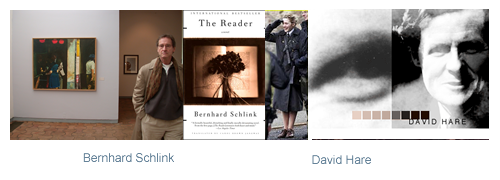
The film, The Reader , adapted by David Hare from a novel by Bernard Schlink, is about an adolescent boy named Michael who falls in love with Hanna, a much older woman, only to discover she is a Nazi war criminal. Kate Winslet stars as Hanna with Ralph Fiennes as the adult Michael.
"If you ask me what a screenwriter’s job is, then I would best define it as managing disappointment.Of course the low status of the screenwriter is an industry joke, but it’s a joke that can get a little bit tiresome. At the moment I’m working on a film of Bernard Schlink’s great novel The Reader. A couple of days ago, I found myself standing outside my hotel in the howling Berlin wind at eight in the morning, waiting for nonexistent transport, because, yet again, the production had forgotten that the screenwriter existed.
Having said all that, my experience on The Hours was more or less a model of good practice. The producer, Scott Rudin, and I worked together without a director for about a year. Then, when we felt the script was ready, we put it out and said to potential directors: “This is the film we want to make.” Scott gave it to a couple of people who said: “Well of course I’ll be wanting to do some work on the script,” to which Scott replied “No. This is the script we’re making.”
![]()






